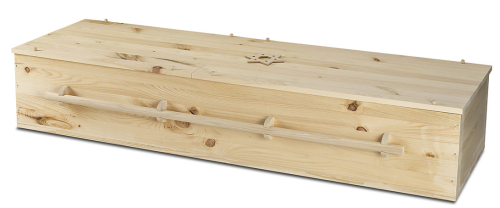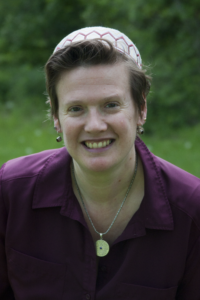Rachel Barenblat's Blog, page 50
January 31, 2020
To Know God
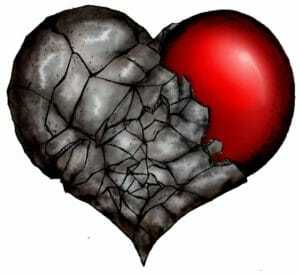 This week's Torah portion (Bo) begins like this:
This week's Torah portion (Bo) begins like this:
God said to Moses, "Go to Pharaoh. For I have hardened his heart and the hearts of his courtiers, in order that I may display these My signs among them, and that you may recount in the hearing of your children and your children's children how I made a mockery of the Egyptians and how I displayed My signs among them, in order that you may know that I am God." (Exodus 10:1)
I like the interpretation that Pharaoh hardened his own heart first, which means God just helped him along -- the spiritual equivalent of, "if you keep making that face, you'll get stuck that way." I can understand that as a spiritual teaching about how the choices we make about compassion (or lack thereof) shape who we are and who we become.
But this idea that God "made a mockery of the Egyptians" so that we would know God -- it's troubling, to say the least. It seems to treat the Egyptians as meaningless pawns in our journey of spiritual awakening. How can we redeem this verse?
Talking this over with one of my hevruta partners this week, here's where I arrived. Yes, Torah and the classical commentators show a distressing lack of concern for the Egyptian people who will suffer under Pharaoh's hardened heart. I can't magic that away. I can temper it by saying that this is a natural way for a traumatized people to react to abuse of power, and surely the children of Israel are traumatized at this point in their story.
And, I don't want to operate from a place of trauma. I reject the idea that the suffering of the Egyptians was fine because hey, it got us to a place of knowing God. And, I'm moved by the fact that Torah says that the whole point of this story is for us to know God.
We could even say: the whole point of our being alive is to know God. Maybe the G-word doesn't work for you. In that case, substitute something that does. The point of our being alive is to know love, or compassion, or justice, or meaning, or truth. The whole reason we're here is to connect with something greater than ourselves -- to "know God."
Maybe this means: to have deep spiritual encounters, to live in such a way that our hearts are open to the sacred. Maybe it means to know each other more deeply, because each of us is made in the divine image. Maybe it means to know creation more deeply, because when we delve into the natural world, we can (in the words of poet and pilot John Gillespie Magee Jr.) "put out [our] hand and touch the face of God." Maybe we seek God through Torah study, or prayer, or environmentalism, or pursuing justice. One way or another, our purpose in this life is to connect with the sacred.
And that leads me to the spiritual practice I find in this week's parsha: approaching everything with that lens. It's the first lens in my spiritual direction toolkit: "Where is God in this?" If someone in a position of power has hardened their heart and they're making choices that harm me, how can I harness that experience to open myself to God? How can I choose to center justice and love and hope, even when others are acting unethically -- or especially then?
I love this as a spiritual practice. And... it's really important that it's a practice I'm choosing, not one that's imposed from outside. It's one thing for me to say that I want to respond to a hardened heart by opening to holy connection. It's another thing to say that anyone else has to respond to injustice in the same way. "Your boss mistreated you -- great, what an opportunity for you to know God more deeply!" Um... no. If I were to say that to someone who'd been mistreated, that would be rabbinic malpractice.
Here's the choice I think we each have: when we encounter injustice -- when someone hardens their heart and acts wrongly -- will we harden ours in return, or will we choose to soften and to make space for the ineffable? I'm not talking about softening to an abuser. I'm talking about making the choice to keep our hearts open to God even in the face of injustice and suffering.
Torah says the whole drama of the plagues and the Exodus happened so we would know God. This year, that says to me: whatever's unfolding in our lives -- on a personal scale, on a communal scale, on a national scale -- can be an opportunity to soften our hearts and to more deeply know God... if we choose to use it that way.
Finding God in whatever's unfolding won't erase injustice, but it can give us resilience in the face of injustice. It won't erase suffering, but it can give us hope in the face of suffering. And maybe that resilience and that hope will give us the capacity to create justice: for ourselves, and for everyone.
This is the d'varling I offered at my shul this morning. (Cross-posted to my From the Rabbi blog.)

January 24, 2020
The far shore
This is how the year ends.
We've carried your memory, and now
we dedicate this stone
on the far side of the sea.
We've carried your memory.
Now we look back
from the far side of the sea,
our footsteps washed away.
Now we look back
and blink, disoriented,
our footsteps washed away.
The waves are gentler now.
We blink, disoriented.
I still talk to you.
The waves are gentler now
when I greet your photos.
I still talk to you
in every room
when I greet your photos
as though you were here.
In every room
questions I wish I'd asked
(as though you were here.)
I remember your voice.
Questions I wish I'd asked:
how do we live without you?
I remember your voice.
I don't want to let go.
How we live without you:
we dedicate this stone.
I don't want to let go..
This is how the year ends.

January 22, 2020
Bodies and stones
It's been a while since the last time I helped with taharah, the washing, dressing, and blessing of the body of someone who has died. Once I became single, the dynamics of finding childcare for my son on a moment's notice shifted. Also as The Rabbi, when someone dies I'm usually occupied with funeral preparations. I haven't been able to say yes to helping with taharah in a while.
In this case (and this is not usual), I'm not presiding over the funeral -- and the person who died wasn't a member of my synagogue community, either. Before she died, her family reached out to ask whether we would care for her body before the casket is taken to the place where the funeral will be. I'm glad that after considering the ask, my congregants said yes.
There is something poignant about being asked to step in and help with this mitzvah during the days immediately preceding my mother's unveiling (the dedication of her gravestone) over which I will soon preside. I remember a conversation I had at her burial: a man I did not know, telling me that he had sat with the casket overnight so that her neshamah wouldn't feel alone.
This is how the fabric of community is woven. We step up and we do these things for each other, mitzvot that cannot possibly be repaid. We tenderly pray over and wash and dress each body before burial. We sit with each casket so that the soul of the deceased does not feel fear during the tender transition out of this life. We shovel graveside earth with our own hands.
The pebble I will place on my mother's grave is smooth and grey. I carried it in my pocket as I did taharah, linking this mitzvah done for a woman I did not know with the same mitzvah that strangers performed for my mother. Tomorrow I'll fly with this pebble to Texas. Sunday I'll place it on Mom's stone, a reminder that she is remembered, a marker of my passage through.

Tether
These letters, kite-string
or umbilicus: do they
tether you? When I
stop writing will you
dissolve, a water droplet
rejoining the flowing stream?
Maybe I'm the one
tied to what was,
not willing to disentangle.
When I wasn't looking
this year changed me.
Still homesick sometimes, but
I've learned to sleep
in this strange bed
where sometimes, I know,
I will see you
in dreams. Gone but
still here. Almost enough.

January 20, 2020
The weather
Things I can't know,
a partial list: how cold
the cemetery will be this time
how bruised my heart will feel
-- or not -- and most of all
would you wear sandals?
I don't think the dead
pull climate strings, but
if it were up to you
you'd want Texas to put on
her prettiest face
when we remember you.
You'd want our grief
to melt like thin ice
in morning Texas sun.

January 17, 2020
The world is our kin: lessons from Moshe about being an upstander
וַיְהִ֣י ׀ בַּיָּמִ֣ים הָהֵ֗ם וַיִּגְדַּ֤ל מֹשֶׁה֙ וַיֵּצֵ֣א אֶל־אֶחָ֔יו וַיַּ֖רְא בְּסִבְלֹתָ֑ם וַיַּרְא֙ אִ֣ישׁ מִצְרִ֔י מַכֶּ֥ה אִישׁ־עִבְרִ֖י מֵאֶחָֽיו׃
Some time after that, when Moses had grown up, he went out to his kinsfolk and witnessed their labors. He saw an Egyptian beating a Hebrew, one of his kinsmen. (Exodus 2:11)
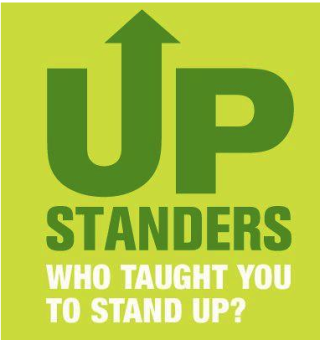 I always imagined that Moshe didn't know, growing up, that he was an Israelite. He grew up in Pharaoh's household as though he were a grandchild of Pharaoh. Surely Pharaoh didn't know the baby's origins -- he wouldn't have let his daughter adopt a Hebrew baby when he'd just ordered them all drowned, right?
I always imagined that Moshe didn't know, growing up, that he was an Israelite. He grew up in Pharaoh's household as though he were a grandchild of Pharaoh. Surely Pharaoh didn't know the baby's origins -- he wouldn't have let his daughter adopt a Hebrew baby when he'd just ordered them all drowned, right?
Along with that, I've imagined a dramatic moment when Moshe discovers that he wasn't originally part of the ruling family. A moment when Moshe learns that he was born into a slave household rather than the royal one. But Torah here calls the Hebrew his kinsman. In this moment, it seems that he knows.
Two enticing possibilities flow from that. One is that Pharaoh's daughter told him, in secret, where he came from and who he really is. Maybe he's always known that he is secretly part of his nation's most oppressed people, rescued only by miracle, and that his destiny would be to help his people go free.
Or maybe he grew up as an Egyptian royal kid, having no idea that he was different from the rest of his adoptive family... and when he saw the overseer mistreating the slave, he knew in his bones that the man being oppressed was his kin, because all human beings are kin, and mistreatment is never right.
The commentator known as Ramban says that someone told Moshe he was a Hebrew, so he went out to the fields to see what kind of life his kinsmen lived. The commentator known as the Sforno says he was moved to strike the overseer because of a feeling of brotherliness -- he felt that the slave was his kin.
This year I'm moved by the idea that maybe Moshe didn't know his origins. Because in that case, his choice to be an "upstander" -- to step in and protect someone powerless who was being harmed -- was based not in a sense of loyalty to "his own," but in the sense that oppression is wrong, period.
Maybe I'm drawn to that interpretation because I want us to be like that Moshe. I want us to open our eyes to unethical behavior and oppression and abuse of power. I want us to step up and say: that's wrong. The world shouldn't be like that. As a human being, it's my job to protect the vulnerable from harm.
Earlier this week, my son attended an assembly at his elementary school about systemic racism. He came home deeply upset, having learned about the Tulsa Massacre of 1921. Three hundred were killed. Ten thousand became homeless. It's a horrific story of white people slaughtering black people.
My son wanted to know, how could human beings treat other human beings like that? He was shocked and angry and full of grief. I know that his surprise at the horrific viciousness of racism is a sign of his privilege. Through no merit of his own, he's been able to grow up mostly oblivious to racism.
My job now is to help him grow into awareness that we who have privilege are obligated to use our power to help those who don't have it. Because oppression is wrong. Which Moshe knew. And he knew in his bones that the man being beaten was his kin; Torah calls him "kinsman" twice to make that point.
Now, I don't recommend Moshe's methods here. (Killing the overseer: not the way to go.) But Moshe's apparently immediate knowledge that this person who was experiencing systemic oppression is his family, and that therefore he has an obligation to act -- that's Torah's role model for us this week.
Who experiences systemic oppression in our world? I'm not talking about individual acts of mistreatment, but about the systems and structures that give some people an inherent advantage and others an inherent disadvantage. Oppression expressed in the practice of social and political institutions.
[Harvest answers from the room]
Here are some of my answers: Immigrants. Refugees. People of color: at increased risk of unfair sentencing, and of being shot by police because of unconscious bias. Trans people: at increased risk of suicide because of prejudice and mistreatment. Women. Non-Christians. Those who live in poverty.
And, of course, one can be many of these things at once. This week I see Moshe's choice to stand up against the oppression of that Hebrew slave as Torah's lesson for us. Our world contains systems of oppression too, no less than the Mitzrayim ruled over by this Pharaoh who didn't remember Joseph.
Those who are oppressed are our kin, and it's our job to stand up for them as we are able, as Moshe stood up for his kin in the field. Not necessarily because we see ourselves in their faces, though maybe we do. But because oppression is wrong, and Jewish tradition calls us to pursue justice with all that we are.
This is the d'varling I offered at my shul at Kabbalat Shabbat services. (Cross-posted to my From the Rabbi blog.)

Come write with me!
I couldn't be more delighted to announce that I've been named in the Liturgist-in-Residence for the National Havurah Committee's Summer Institute 2020, which will be held from July 27-August 2 in Hartford, CT. Here's the text of their official announcement:
Liturgist-In-Residence 2020: Introducing Rachel Barenblat!
Rachel Barenblat, the “Velveteen Rabbi,” is an American poet, rabbi, chaplain and blogger. She is a founding builder at Bayit: Building Jewish, and serves Congregation Beth Israel in North Adams, MA. In 2016, The Forward named her one of America’s most inspiring rabbis. She has previously served as co-chair of ALEPH with Rabbi David Markus, and as interim Jewish chaplain to Williams College. In 2013 she was named a Rabbis Without Borders fellow by Clal, the Center for Learning and Leadership. Her blog, Velveteen Rabbi, was named one of the top 25 blogs on the Internet in 2008 by Time Magazine. Rachel has written several books of poetry, and has edited / compiled / contributed to a Passover haggadah, a machzor, and a book of prayers and poems for mourners.
Rachel will be teaching three workshops throughout the week:
Session 1 – Psalms of gratitude and praise. We’ll talk briefly about what makes a psalm, explore some psalms of gratitude (from Tehillim / the Book of Psalms, and from contemporary poets), and talk about ways of talking to / about the Holy. Our first writing exercise will serve to “prime the pump” and get words flowing; our second writing exercise will invite a stream of words about gratitude. Then we’ll revise / reshape those words into the first draft of a psalm. We’ll share psalms with each other aloud, and close with a niggun to send us on our way.
Session 2 – Psalms of sorrow. We’ll begin by establishing shared vocabulary around psalms, poems, and spiritual practice. Today’s focus is psalms of anxiety and fear. We’ll explore some of these psalms (both classical and contemporary) and then shift into writing together. Our first writing exercise will prime the pump, and our second will invite words from a place of fear, sorrow, grief, or anxiety. We’ll revise those words into psalms, and those who wish can share them aloud. This session requires particular care because these psalms can evoke or activate difficult emotions. We’ll close this session with a meditative and musical practice designed to help us release our emotions and return to a sense of spiritual safety, and I’ll make myself extra-available after this session for anyone who wants to talk.
Session 3 – Psalms of wholeness. In this session we’ll explore psalms of wholeness and Shabbat. We’ll enter into Shabbat psalms (both classical and contemporary) and then do the week’s final two writing exercises. The first will prime the pump for our creativity (in a way that by now will be familiar to repeat participants), while the second will invite reflections on a hope for Shabbat or a memory of Shabbat. We’ll reshape those words into the first draft of a new Psalm for Shabbat, and will close with a niggun that evokes Shabbat, now on its way!
Participants will have an opportunity to share their original psalms and poetry with the community during the week.
Stay tuned for more information about the roster of classes that will be offered at this summer's institute. For now, save the dates and plan to join us!

January 16, 2020
Pebbles
I know I must have talked with you
after unveilings for relatives
or friends, but I don't remember
what you had to say. Probably
we talked about shopping or haircuts
or Shabbes dinner, what Marie Howe
called "what the living do."
When you drove out of a cemetery
you moved on, but part of me still
hasn't left where we buried you.
Soon we'll gather to bless the slab
that marks the spot. Did you know
the tradition that says we stop
saying kaddish after eleven months
because only wicked souls require
a full year of kaddish to ascend
and we wouldn't want to imply
you weren't righteous? I think
you'd laugh and say whatever works
for us is fine by you, then ask
where we're going for lunch after
and what kind of shoes I'm planning.
Almost eleven months now I've been
writing to you, each line a monument
to memory. These poems,
the pebbles I leave on your stone.

January 12, 2020
Cooking Iranian food with a prayer in my heart
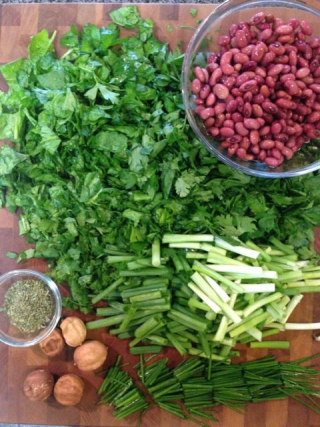 I don't think it was a conscious decision. Consciously, I was thinking: I brought dried limes home from a recent trip to one of the markets in Albany. What can I do with them? Oh, I know. Samin Nosrat talks about dried limes in Persian food; I'll make something Persian! A few days of comparing recipes led me to this slow cooker Ghormeh Sabzi / Persian herb stew recipe.
I don't think it was a conscious decision. Consciously, I was thinking: I brought dried limes home from a recent trip to one of the markets in Albany. What can I do with them? Oh, I know. Samin Nosrat talks about dried limes in Persian food; I'll make something Persian! A few days of comparing recipes led me to this slow cooker Ghormeh Sabzi / Persian herb stew recipe.
But once I was cooking -- inhaling the scent of onions and garlic and turmeric, and then leeks and bunches of parsley and cilantro and last summer's frozen chives chopped and sautéed -- it occurred to me that I was making Iranian food. And I wonder whether the pull toward this recipe came from somewhere deeper than just "what can I make with dried limes."
There's so little I can do about the actions of my nation's government. I know that refreshing the New York Times and the Washington Post and my Twitter stream as often as I habitually do is probably not good for my mental or emotional or spiritual wellbeing, and yet... And yet I do those things anyway, on days that are not Shabbat, and therefore my heart keeps being broken.
My heart is broken by the state of America's body politic. By disinformation and misinformation. By fake news and propaganda. By threats and bluster. By fear for what this administration might do. By the knowledge that war is not an abstraction to military families -- nor to innocents who will be traumatized, or will die, simply because they're in the wrong place at the wrong time.
And I can't do anything about any of it. Sure, I can write to my Congresspeople, and I can volunteer toward electing a president whose values align better with mine, but neither of those will help now. But I can hold the people of Iran in my heart -- and the people of Iraq too, for that matter. I can pray for them (and us) to know hope and connection, health and prosperity.
I would love to visit Iran. To taste the food, to wander the markets, to see the Pink Mosque, to see the ruins of Persepolis, and most of all to meet Iranian people. I don't think that's going to happen anytime soon. But I imagine that if I were able somehow to make it there, people would be warm and welcoming. People are warm and welcoming everywhere I've ever been.
I remember traveling in Jordan the year before the Iraq war began, fearful that people would be angry about the actions of my nation's government. And yet when I acknowledged where I'm from, every single person I met welcomed me. Some of them indicated that they weren't fans of President Bush (hey, neither was I!) but none of them held my nationality against me.
When we meet each other as human beings, with curiosity and openness, we can learn so much about each other -- and also about ourselves. That's why travel is so broadening. And even if we can't travel, we can seek to meet others in the places where we are. My understanding of my religious tradition calls me strongly to welcome the immigrant, the refugee, the stranger.
There's so much brokenness in the world today. It breaks my heart that my nation now accepts fewer refugees than ever before. And that this week my nation veered close to the brink of war with Iran. And that we are living in times of rising xenophobia in so many places. I can't fix any of these. Today all I can do is cook Persian food and hold the people of Iran in my prayers.

January 11, 2020
Vayechi: angels, memory, blessing
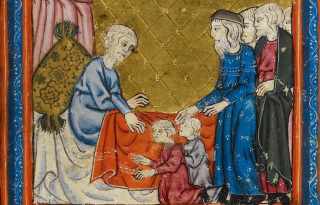 This week's Torah portion, Vayechi, begins with Jacob on his deathbed. Joseph comes to him with his sons Ephraim and Menashe, and Jacob marvels: he hadn't expected to see Joseph again, and now here he is with Joseph and the next generation too! He blesses the boys with a verse (Genesis 48:16) that became part of the liturgy of the bedtime shema -- "May the angel who kept me from harm, bless the ones who come after," in Reb Irwin Keller's beautiful translation that we sang this morning.
This week's Torah portion, Vayechi, begins with Jacob on his deathbed. Joseph comes to him with his sons Ephraim and Menashe, and Jacob marvels: he hadn't expected to see Joseph again, and now here he is with Joseph and the next generation too! He blesses the boys with a verse (Genesis 48:16) that became part of the liturgy of the bedtime shema -- "May the angel who kept me from harm, bless the ones who come after," in Reb Irwin Keller's beautiful translation that we sang this morning.
The syntax of this verse is unclear. Rashi reads it in a literal, non-mystical sense. He thinks Jacob is talking about the angel whom God sent to wrestle with him at the banks of the Jabbok. But many translations capitalize Angel, because the way the sentence is phrased makes it seem as though Jacob is referring to God as an Angel, both a protector and a source of blessing. As Reb Irwin writes, "So he could mean a guardian angel, or he could mean God, or he could intend the ambiguity, knowing that angels are just a face of the Divine anyway."
Reading these verses this year, I couldn't help remembering last February when I took my son to Texas to say goodbye to my mother. I knew when we flew down that it would be our last time seeing her alive.
While we were there, she soaked up every moment she could with her youngest and final grandson. She managed to get out of bed once to sit with him while he ate dinner. I remember that she asked him about his favorite cartoon -- an anime called Pokémon, which was completely foreign to her, but he happily told her all kinds of details about the various Pokémon and their evolutions. And -- this is a story I told in my Yom Kippur sermon, Come... and Prepare to Go -- she came downstairs for that final Shabbat, and heard him sing the words of the kiddush over wine one last time.
My mom didn't use the language of "blessing" each other, and angels were not part of her Judaism. They were as foreign to her as Pokémon. But I think her presence with her generations that Shabbat was the blessing she was able to give us from her deathbed. She spent the last of her strength making it to her wheelchair to come downstairs for Shabbes dinner because celebrating Shabbat with her children and grandchild mattered to her. She showed us with her actions that family and Jewish tradition had been a blessing for her that she hoped would continue to be a blessing for us.
Her unveiling approaches in two weeks. I still think of her every week when I make challah, remembering that she tasted my homemade challah on that last Shabbes of her life and declared it good. And my son remembers her when we make kiddush on Friday nights, because he was proud of being able to sing those words where she could hear. In these ways she's still with us even though she's gone. Sometimes I imagine that she peeks in at our Shabbes table each week, like the two angels described in Talmud who seem able to say only one thing: "May next week be just like this one." Even on the weeks when we only spend a few minutes over candles and wine and challah, I like to imagine that she feels joy when she sees us carrying this tradition forward.
Before he dies, Jacob reminds Joseph that he wants to be buried in the same place where his parents are buried. Joseph gets Pharaoh's permission to travel, and then Joseph carries Jacob's bones back to the Cave of Machpelah before returning to Egypt.
Later in Torah, this carrying of bones will be recapitulated. Moshe will take Joseph's bones out of Egypt when the children of Israel depart. The word used in that verse (Exodus 13:19) is etzem, which means both bone and essence. I see a deep truth in these two parallel stories. No matter where our forebears are buried, we carry their essence with us. Like Joseph, and like Moshe, we carry our forebears with us. Sometimes their physical features reverberate through the generations. Sometimes their traumas, their memories, and their stories live on in us. And that's true whether or not those whom we remember were good to us, whether or not they could be be the parents or grandparents we needed them to be. We carry both the bitter and the sweet.
May the memories of those whom we carry -- in our minds and hearts, and sometimes also in our DNA -- be the blessing that we need in our lives. May they inspire us to live up to our best selves. May they help us shed any baggage, any hurts, so we can grow beyond them and not transmit them further. May we experience their memories as a blessing for us... so that we can transmit that blessing in turn to those who come after, our children and the children of our children. Or in the rabbinic reinterpretation, our students and their students and the students of our students. So that all of us can experience ourselves as part of a chain of generations and a chain of blessing, watched-over by that same angel (or Angel) whom Jacob evoked so long ago.
This is the d'varling I offered at my shul on Shabbes morning (cross-posted to my From the Rabbi blog.) Image from the Golden Haggadah.

Rachel Barenblat's Blog
- Rachel Barenblat's profile
- 6 followers


